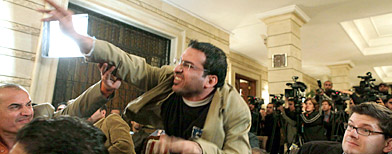
Richard Nixon was so preoccupied with the Kennedy family and the possibility of another defeat handed to him by another Kennedy -- Ted -- that he ordered aides to recruit Secret Service agents to spill secrets on the senator's behavior.
The president tried to catch Kennedy cheating on his wife, while at the same time finding the couple to be "crude" in their "super-swingin' jet-set" lifestyle.
In a series of stark Oval Office conversations about Kennedy before the 1972 election, Nixon spoke with aides John Erhlichman, H.R. Haldeman and Ron Ziegler.
Nixon wanted to find a way to keep an eye on Kennedy.
"Do you have anybody in the Secret Service that you can get to?" he asked. "Yeah, yeah," Ehrlichman replied.
"Plant one," Nixon said. "Plant two guys on him. This could be very useful."
Nixon made clear that the Secret Service protection afforded Kennedy before the 1972 election would be rescinded after. Then, said the president, "If he gets shot, it's too damn bad."
Tape recordings from the Nixon White House betray a preoccupation with the Kennedy mystique and how that might be used against the Republican president by the last surviving brother, who died Tuesday at age 77.
Nixon's men had investigators tail Ted Kennedy on a Hawaii vacation and when he was at his Martha's Vineyard haunts.
"He was in Hawaii on his own. He was staying in some guy's villa. He was just as nice as could be the whole time," Ehrlichman reported.
On the night of July 18, 1969, Kennedy had driven off a bridge into the water at Chappaquiddick, Mass., swimming to safety while the woman with him, Mary Jo Kopechne, drowned. He pleaded guilty to leaving the scene of an accident, and a judge said his actions probably contributed to her death. He got a suspended sentence and probation.
Nixon wanted a sharp and private eye kept on Kennedy's movements after Chappaquiddick, hoping to expose another misstep with a woman other than his wife, Joan.
"The thing to do is watch him," Nixon said.
During that talk, Nixon's aides spoke in mortified language about how Joan Kennedy wanted to wear "hot pants" to a White House function until her husband talked her out of it. The talk also drifted into his Joan's eye-popping outfit at a White House luncheon.
One exchange:
Haldeman: "Did you see his wife came here at the White House again � crazy outfit...."
Nixon: "What did she wear?"
Haldeman: "Some leather gaucho, with a bare midriff or something."
Ziegler: "Well, no, they put on a body stocking which is flesh tone."
Haldeman: "Oh, is that it?"
Ziegler: "And then they wrap the leather gaucho type thing around it. So you look at it from a distance, and you think my God, there she is."
Haldeman: "She was going to wear hot pants but Teddy told her she couldn't."
Ziegler: "They're weird people, they really are. I mean, even the _"
Nixon: "It's crude. What the hell's the matter with them? What's she trying to prove?"
Haldeman: "Whatever it is, she ain't gaining many votes, because they've got � the super-swinger, jet-set types are going to be for them and not for you no matter what happens."
Ziegler: "The super-swingin' jet-set types don't even relate to that type thing. It's a very, very small group."
Haldeman: "Middle American folk, that's desecration of the White House to most Americans ..."
Ziegler: "She has to have some sort of hang-up herself personally. She knows what Teddy was doing out there with that girl, running her into the water, you know, and what he's been doing."
Haldeman: "But that family's used to that."
Nixon: "They do it all the time."
But in the aftermath of the Chappaquiddick scandal, Kennedy was careful not to step out of line, the tapes suggest.
"Does he do anything?" Nixon asked in a September 1971 meeting. "No, no, he's very clean," Ehrlichman replied.
"President Nixon never forgot his humiliating defeat in the 1960 presidential election to John F. Kennedy," said Luke A. Nichter, a leading authority on the Nixon White House recordings and assistant history professor at Texas A&M University. "Nixon did not intend to simply win in 1972; he wanted to destroy his opponent."
"If that opponent was a Kennedy, Nixon cautiously welcomed that opportunity but left nothing to chance," Nichter said. "That is what these long-obscured recordings show us."
Nichter features and analyzes the recordings at his Web site, nixontapes.org. The material has been released by the government over the years.
By April 1971, when the first of these exchanges was captured by the White House taping system, Kennedy was a damaged political figure.
Despite the Chappaquiddick episode, Nixon was plainly worried about Kennedy's political potency yet confident the Democrat could not restrain a philandering impulse. "I predict something more is going to happen," he said. "The reason I would cover him is from a personal standpoint -- you're likely to find something."
Nixon pressed for more wiretaps and a combing of tax records, not only on Kennedy but other leading Democrats. "I could only hope that we are, frankly, doing a little persecuting," he said.
At one point, he expressed hesitation about whether his actions were proper.
The moment quickly passed.
"I don't know," Nixon mused to Haldeman, his chief of staff. "Maybe it's the wrong thing to do. But I have a feeling that if you're going to start, better start now."
Because Kennedy was not a presidential candidate in 1972, he did not qualify for full-time Secret Service protection. But Nixon offered it to Ted Kennedy, given the assassinations of his brothers, President John Kennedy and Sen. Robert Kennedy, and right after Alabama Gov. George Wallace was shot in May 1972.
The offer was conveyed by Treasury Secretary John Connally, who was in charge of the Secret Service, in a phone call with Kennedy. The former Texas governor was riding in the car with JKF and was wounded when the president was assassinated in Dallas.
"Very frankly," Connally said, "I don't know that they could save you but there's a damn good chance they could if some nut came up. And you ought not to be reluctant about it. I know you're not a candidate but you're exposed."
Ted Kennedy expressed thanks and asked for protection at his home, to start.
But Nixon's motives for the offer were not pure. He worried that if a third Kennedy were shot, and while not having Secret Service protection, he'd be blamed.
Plus, he wanted dirt. And the best way to get it was to have a Secret Service agent rat on the senator. There is no evidence an agent turned into such an informer.
"You understand what the problem is," Nixon told Haldeman and Ehrlichman on Sept. 7, 1972. "If the (SOB) gets shot they'll say we didn't furnish it (protection). So you just buy his insurance.
"After the election, he doesn't get a ... thing. If he gets shot, it's too damn bad. Do it under the basis, though, that we pick the Secret Service men.
"Understand what I'm talking about?"

 Richard Nixon was so preoccupied with the Kennedy family and the possibility of another defeat handed to him by another Kennedy -- Ted -- that he ordered aides to recruit Secret Service agents to spill secrets on the senator's behavior.
Richard Nixon was so preoccupied with the Kennedy family and the possibility of another defeat handed to him by another Kennedy -- Ted -- that he ordered aides to recruit Secret Service agents to spill secrets on the senator's behavior. Internet companies and civil liberties groups were alarmed this spring when a U.S. Senate bill proposed handing the White House the power to disconnect private-sector computers from the Internet.
Internet companies and civil liberties groups were alarmed this spring when a U.S. Senate bill proposed handing the White House the power to disconnect private-sector computers from the Internet.




